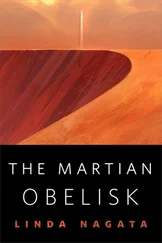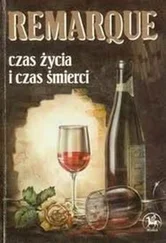“No, no! It’s just—I simply wanted—”
I wait. Pressure has no place in our business. After a while the woman says: “It’s for my husband—”
I nod and continue to wait. At the same time I turn toward the row of little Belgian headstones. “These are very much in demand,” I say finally.
“Yes—It’s just that—”
She breaks off again and looks at me almost beseechingly. “I don’t know whether it’s permissible—” she finally forces herself to say.
“What, to put up a tombstone? Who could possibly forbid that?”
“The grave is not in the churchyard—”
I look at her in surprise. “Our pastor will not allow my husband to be buried in the churchyard,” she says softly and quickly with averted face.
“But why not?”
“He committed—because he did violence to himself,” she bursts out. “He took his own life. He could not stand it any longer.”
She stands there staring at me. She is still frightened by what she has said. “You mean because of that he may not be buried in the churchyard?” I ask.
“Yes. Not in the Catholic cemetery. Not in consecrated earth.”
“But that’s nonsense!” I say angrily. “He should be buried in doubly consecrated earth. No one takes his own life except in despair. Are you quite sure that’s right?”
“Yes. Our pastor says so.”
“Pastors talk a lot. That’s their business. Where is he to be buried then?”
“Outside the cemetery. On the other side of the wall. Not on the consecrated side. Or in the municipal cemetery. But that won’t do at all! All sorts of people are buried there.”
“The municipal cemetery is more beautiful than the Catholic one. And there are Catholics buried there too.”
She shakes her head. “He was pious,” she whispers. “He must—” Her eyes are suddenly full of tears. “He can’t possibly have remembered that this way he would not be allowed to lie in consecrated earth.”
“He probably didn’t think about it at all. But don’t grieve at what your pastor says. I know thousands of very pious Catholics who lie in unconsecrated earth.”
She turns to me. “Where?”
“On the battlefields in Russia and France. They lie there all together in mass graves, Catholics and Jews and Protestants, and I don’t think it makes a bit of difference to God.”
“They fell in battle. But my husband—”
Now she is weeping openly. In our business tears are taken for granted, but these are different. Besides, the woman is a little bundle of straw; she looks as though the wind could sweep her away. “Very likely at the last minute he repented,” I say just to say something. “In that case everything is forgiven.”
She looks at me. She is so hungry for a bit of comfort. “Do you really think so?”
“I certainly do. Of course the priest would not know. Only your husband knows. And he cannot tell you now.”
“The pastor says that mortal sin—”
“Dear lady,” I interrupt her, “God is far more compassionate than the priests, believe me.”
I know now what torments her. It is not so much the un-consecrated grave; it is the thought that her husband, as a suicide, must burn in hell for all eternity and that he could perhaps get off with a couple of hundred thousand years in purgatory if he could be buried in the Catholic cemetery.
“It was on account of the money,” she says. “It was in the savings bank, a guaranteed deposit for five years; he could not withdraw it. It was the dowry for my daughter by my first marriage. He was her guardian. When he withdrew the money two weeks ago, it was not worth anything at all, and her fiance broke off the engagement. He thought we would have a good dowry. Two years ago it would still have been enough, but now it’s not worth anything. My daughter did nothing but weep. That’s what he couldn’t stand. He thought it was his fault; he should have paid stricter attention. But after all, it was a guaranteed deposit; we couldn’t withdraw it. That way the interest was higher.”
“How was he expected to pay stricter attention? This sort of thing happens to lots of people nowadays. After all, he wasn’t a banker—”
“No. A bookkeeper. The neighbors—”
“Don’t bother about what the neighbors say. They’re all malicious gossips. Just leave everything to God.”
I feel that I am not very convincing, but what can one say to a woman in such circumstances? Certainly not what I really think.
She dried her eyes. “I ought not to tell you all this. What concern is it of yours? Forgive me! Sometimes one doesn’t know where to—”
“It doesn’t matter,” I say. “We are used to it. All the people who come here have lost somebody.”
“Yes—but not the same way as—”
“Oh yes,” I explain. “In these times that happens much oftener than you think. Seven in the last month alone. They were people who no longer knew which way to turn. Respectable people, I mean; the disreputable ones get by.”
She looks at me. “You think that one can put up a tombstone even when it’s not in consecrated ground?”
“If you have a permit for a grave, you certainly can. Unquestionably in the municipal cemetery. If you wish you can pick one out now. You don’t need to take it until everything is arranged.”
She looks around. Then she points to the third smallest headstone. “What does one like that cost?”
It’s always the same. The poor never ask the price of the smallest ones first: it’s as though they avoided doing it out of a strange courtesy toward death and the dead. They do not want to ask about the cheapest first; whether they take it later on is another matter.
There’s nothing I can do to help her; that piece of stone costs one hundred thousand marks. She opens her tired eyes in alarm. “We can’t afford that. It’s much more than—”
I can well imagine it is more than is left of the inheritance. “Then take this small one,” I say. “Or simply a plaque without a stone. Look, here is one—it costs forty thousand marks and is very handsome. After all, what you want is for people to know where your husband is buried, and a plaque is just as good for that as a stone.”
She examines the sandstone plaque. “Yes—but—”
She probably has barely enough for the next month’s rent. Nevertheless, she doesn’t want to buy the cheapest—as though that made any difference at all to the poor devil! If, instead, she had had more understanding earlier and had carried on less about her daughter, perhaps he would still be alive. “We could gild the inscription,” I say. “Then it will look very dignified and distinguished.”
“Will the inscription cost extra?”
“No. It’s included in the price.”
That is not true. But I can’t help myself; she is so sparrow-like in her black clothes. Now if she wants a long quotation from the Bible I am sunk; the cutting would cost more than the plaque. But all she wants is the name and the dates 1875-1923.
She pulls a package of bills out of her pocket; they have been crumpled and then carefully smoothed out and tied in a bundle. I take a deep breath—payment in advance! That hasn’t happened for a long time. Earnestly she counts out two piles. There is not much left over. “Forty thousand. Will you count it?”
“I don’t need to. I’m sure it’s correct.”
It must be correct. She has certainly counted it over many times. And who but she would stoutly pay in advance? Why else had her husband committed suicide? “I’ll tell you something,” I say. “We’ll give you a cement grave enclosure too. Then it will look very neat and separate.”
She looks at me anxiously. “For nothing,” I say.
The ghost of a sad little smile flits across her face. “That’s the first time anyone has been kind to me since it happened. Not even my daughter—she says the disgrace—” .
Читать дальше








